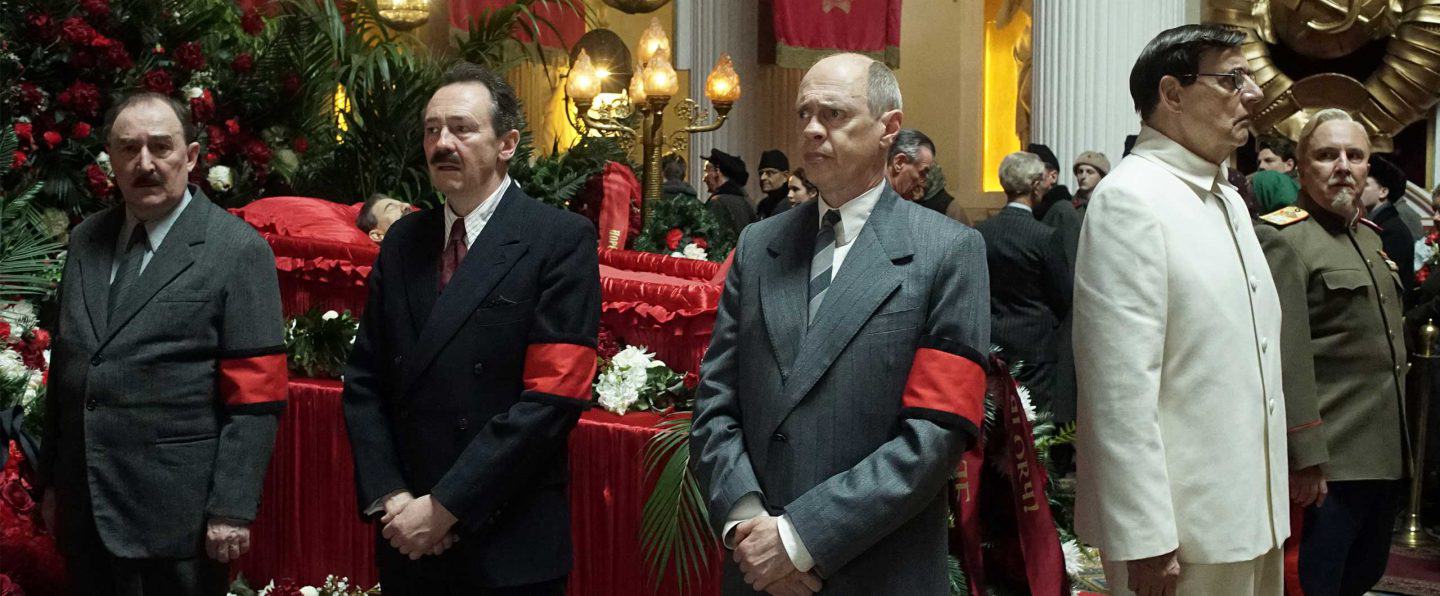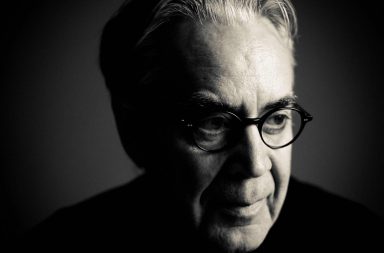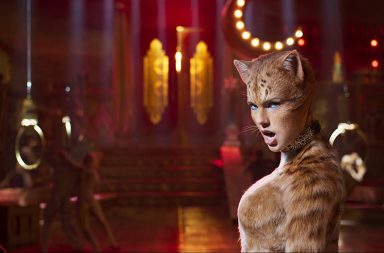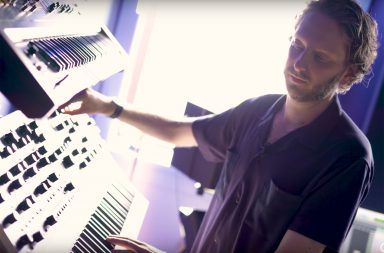Christopher Willis is young, yet he has already lived many lives. The British composer, born in 1978, began his musical career as a pianist, before studying musicology, specializing himself in eighteenth-century music and in the works of Italian composer Domenico Scarlatti. His encounter with Rupert Gregson-Williams led him to dive more seriously into film scoring, composing additional music for big Hollywood productions with Harry Gregson-Williams (X-Men Origins: Wolverine, Shrek Forever After), Henry Jackman (X-Men First Class), Carter Burwell (The Twilight Saga: Breaking Dawn – Part 2) and many others. He would then begin a collaboration with Armando Iannucci on HBO’s satirical series Veep, that is now extended to cinema with The Death of Stalin. Willis is also very active in the world of animation, scoring, besides other projects, all the episodes of Disney’s brilliant Mickey Mouse revival.
The Death of Stalin, adapted from the French comic book of the same name, depicts the power struggles among the high authorities of the Communist Party for the succession of the Soviet Empire’s leadership, with Iannucci’s usual black humor. Christopher Willis composed a remarkable work of Russian inspiration, offering film music at its best, with clever references to the Soviet avant-garde composers. Today, the composer shares with us his thoughts and experiences about scoring the hilarious historical satire.

The funeral of Stalin. From far-left to left: Lazar Kaganovich (Dermot Crowley), Anastas Mikoyan (Paul Whitehouse), Nikita Khrushchev (Steve Buscemi), Georgy Malenkov (Jeffrey Tambor), Nicolai Bulganin (Paul Chahidi). All rights reserved to eOne Films/Gaumont.
You did many things before becoming a film composer. How did you end up writing music for films?
I’ve always dreamed of being a composer, but I wasn’t sure of the way to go about it. I grew up pretty much in the world of classical music and was sort of a restless soul there. I was a pianist for a few years, studying at the Royal Academy of Music in London and then, I have been to Cambridge as an undergraduate and I went there back again to do a Ph.D. It wasn’t until my mid- to late-twenties that I realized that film music was the domain that I should have been doing all this time. I’ve always loved film but I had never listened closely to film music and suddenly, I became very infused about it. I was lucky enough to be in touch with Rupert Gregson-Williams, and even though I had very little experience with film music, he took a chance on me and gave me a job in his studio. I owe a lot to Rupert for mentoring me and showing me a lot about the way film music works.
At what point did you get involved in The Death of Stalin?
I had a conversation with Armando Iannucci just after he had won two Emmys for Veep; he was actually planning to leave the series, so we met up and had a very fun conversation about a lot of things. That’s when he mentioned the film and I was immediately drawn to it. I think both Armando and I have been wanting this challenge of doing something broader. In Veep, we stayed pretty focused on the politicians and the games they play, but in Stalin, it’s necessary for the camera to go out into the world and see what the results of Stalin’s actions and the other politician’s actions are. Musically, it was really exciting.
How close did you work with Armando Iannucci?
Sometimes, he gives me directions, but I think I’m fortunate in that we have quite a lot in common: we both are great lovers of classical music and, it’s true to say, we grew up on similar comedy – in fact, to some extent, I grew up on his comedy, because I was a teenager in England when he became famous there. I was an avid listener to his radio programs and a watcher of his TV shows. I suspect that we have always avoided some of the misunderstandings that might happen on other projects, because I think we have a good understanding.
Armando has a great knowledge of classical music. Was the preexisting material, such as Mozart’s piano concerto that opens the film, already included in the script? Did you intervene on any of these choices?
The Mozart and the Tchaikovsky are both drawn from the historical record. The concert at the start of the film is largely a true story. We did actually re-record all that music, so that it would be sonically similar to the score cues – and that’s actually me playing the piano in the Mozart. I think I might have suggested the Chopin prelude that Maria is playing at the party… We were looking for a piece of Chopin that could be played angrily (laughs). Of course, what we decided not to do is to actually bring pieces of Russian music into the score, although we discussed that a little bit early on. We realized at an early stage that it would be wonderful if I could immerse myself in the music of Russia in the 50s enough so that it would actually all just be score, but sounding like Soviet music. Then it could be very organic, with the same themes, the same motifs recurring through the film… A million things would be possible with a composer writing the score from scratch rather than picking and choosing morceaux of Shostakovich or whoever else.
The score refers explicitly to Shostakovich, Myaskovsky, Mosolov… The whole score, by the way, is built almost like one of these grand, glorious symphonies – I’m thinking of course of the main cue, which sounds like the finale from Shostakovich’s Fifth Symphony. How important was the research work?
I felt that the best approach for this film would be to really wear a particular hat, if you like. One film that was at the back of my mind was Young Frankenstein, which is a comedy, but the score seamlessly inhabits the world of 1930s horror films. So I felt that something similar might work well here: the music sets the stage, sets the tone, and… somehow, any whiff of a 2017 composer trying to lend pathos in a straightforward way would be dangerous. It’s hard to explain, but it might just spoil the effects of the comedy. So I immersed myself into the scores of Shostakovich, Weinberg, Myaskovsky as you said, and various others… There was more of a school of Soviet composition than I had realized. It was a wonderful process of education! I didn’t know that repertoire especially well, actually. Prokofiev would be the one that I knew best, and he, in a way, is a little bit of a red-herring because he was very cosmopolitan, while we were trying to get this very specific sound of the Soviets, the ones that never left.
Is it helping to be a musicologist to mimic these compositions and styles?
I had a lecturer in Cambridge who described Shostakovich’s music as being “battleship-grey” (laughs), in other words, that it’s not really memorable. My educational background… It’s hard to imagine what it would be like not having it. So yes, I approach it and I think about it in the same way I used to approach and analyse a big sonata movement by Beethoven: just trying to understand the nuts and bolts of the language. Why do the lines go the way they do, how long do we stay in one key, which instruments do we use, what are the proportions… I suppose that ultimately, it becomes a very instinctive thing. I don’t know… I couldn’t say that it was an entirely rational thing. At the end of the day, after six months of listening to that music all the time, I was just sort of sitting down and throwing myself into it but I couldn’t say if it was an entirely intellectual exercise, if you know what I mean. In fact, I found afterwards that the Russianness started spilling into the other projects that I was doing. I do a Disney Junior show called The Lion Guard, which is a very epic adventure story based on The Lion King, and there were definitely a few episodes I did a month or two after I finished Stalin, that were rather Russian-sounding (laughs)!
How much time did you spend writing and recording the score?
I think I started tinkering in 2016… I was working on other things at the same time, but yeah, I was tinkering, experimenting and researching for a few months, and then I got cuts of the film. I think September, October 2016. So, there was basically a three-month period where I didn’t write anything but it was all experimentation and research. Actually, I wrote a few pieces that I threw away, just trying to build up that facility. Then, it was mostly over the course of three or four months around Christmas. I actually found that I sped up a great deal: towards the end, I think I finally achieved my best level of “Sovietosity” (laughs), so I did a lot of rewrites and wrote a few new pieces in the last couple of weeks. I wrote A Comedy of Terrors, the end credits’ piece, mostly on the night before I flew to Belgium to record. But that was at a moment in which I was most at ease with that style, so, in a way, I had been preparing it for several months.
I’m thinking about what you said earlier, concerning Young Frankenstein. John Morris, who scored almost all of Mel Brooks’s films, has made an art out of avoiding the musical clichés. What your score achieves brilliantly, in the tradition of John Morris, is avoiding the clichés of the propaganda music, but it also never undertones the humour, which I think actually adds to the film’s quirkiness.
I have listened a little bit to the film music of Shostakovich, and I’ve found – and I think Armando too – that, if I can say this, the slightly schlockier symphonies of his, in other words the symphonies that are closer to film music, like the Eleventh, The Year 1905, were often the most useful to us in how they are sort of keeping things moving and expressing what we wanted to. As you say, not making it sound like a comedy, but making it sufficiently bombastic and old-fashioned that there could be something not entirely contemporary and normal about it. It wouldn’t sound like Schindler’s List, you know. But you’re right, I think if it would have gone all the way into propaganda, it would have sounded like newsreel music, and that wouldn’t have worked either. I was very lucky that there was so much source material, we were able to listen to lots of things and think quite efficiently and not too intellectually about what works and what doesn’t. There’s kind of a nervousness in Soviet music where something might start off sounding happy and then, for whatever reason, whether it is because the dissonance creeps in, or because it was the mood of the composer, it is not happy at all. That was very useful.
This is exactly what we can hear in the End Titles.
Yeah! This theme is based on a piece from the middle of the film, when Stalin’s funeral preparations are happening. I think because this style was already existing, it was possible to learn how to do it and put it in the film, without quite understanding what it is. I love that mode, particularly some Weinberg finales that are like that. Shostakovich too! But why exactly they wrote like that, and what they were expressing, I’m still not entirely sure, but I enjoy writing in that way.
I felt like the music at the end of the film was like an open door expressing what was going to come for the next few years in the USSR after Stalin’s death. And it begins right before the End Titles, when we see Brezhnev standing behind Khrushchev at the concert given by Maria Yudina.
Yes, right. The Mozart, you might naturally want it to have a rallentando at the end, but I think it came from Armando not wanting it to rallentando, so there isn’t really a sense of closure. Then, for the end credits, there’s some kind of festive quality to it, but we know that the madness is going to continue to some extent – the subtitles tell us that Khrushchev will demote the others and that Brezhnev will eventually remove Khrushchev… I love what they did with the visuals in this sequence, by the way. The music was already written, so they were able to edit the photo scratches and things to the music.
I think your scores for the Disney animated series are quite a challenge – Disney has always featured complex scores and singing sequences in their films and series. Will you continue to do that?
I find that Mickey Mouse is still enormously challenging after five years or so, it requires so much energy… We have a fifth season of Mickey Mouse coming up, and there are many crazy ideas. I actually just got approval for a full orchestra for a special cartoon that is coming up. There’s also going to be a ride at Disney World which I’m currently working on, based on Mickey Mouse. It will be structured around songs, so it will be very old-fashioned, like Pirates of the Caribbean or the Haunted Mansion ride, where you have those songs… I’m very excited about that, it’s going to be delightful. In some ways, it’s a very old-fashioned ride that takes up a huge area, Disney’s largest footprint for a ride anywhere in the world, but it is also very futuristic. I can’t talk much about what will happen there, but you’ll feel like you’ve been sucked inside a cartoon. Russia next to that… Nice contrast! But you know, the taste of the guys who work on Mickey Mouse are very, very broad, and we’re often in this retro territory of mid-century music… When Hollywood things in the middle of the century went dark and action-packed, they sounded very close to what the Soviets were doing, so sometimes, I realize, “Oh, I know how to do this now!”, with all the time I spent on Shostakovich, and it goes right straight into Mickey Mouse!
Interview prepared, conducted and transcribed by Valentin Maniglia
Edited by Marine Wong Kwok Chuen



